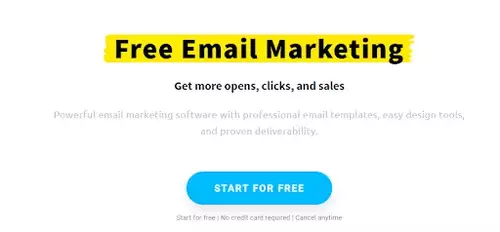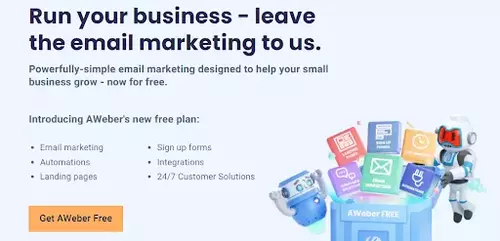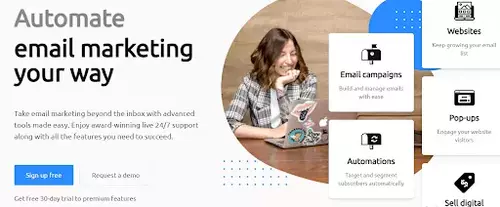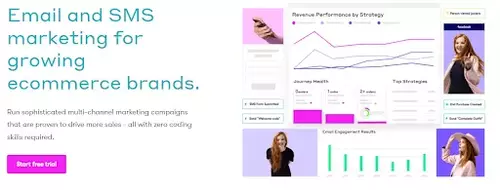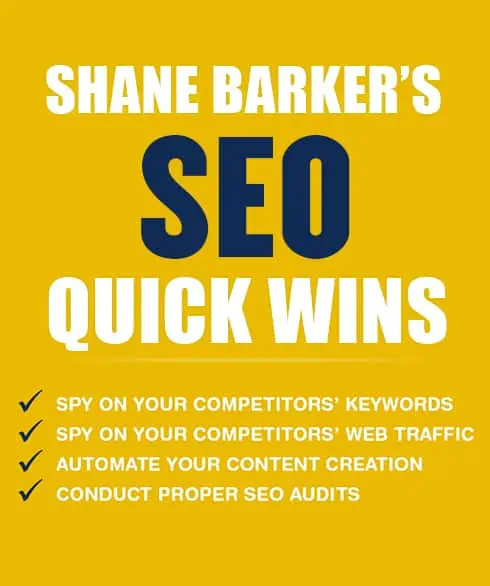Email marketing is a traditional and effective marketing technique that almost all businesses use. If you leverage it properly, it can yield good results and help you win a lot of customers.
However, as a company grows, it becomes increasingly difficult to manage email marketing manually. At some point, all businesses need to upgrade to an email marketing solution that can help them automate and manage their email campaigns.
Depending on your needs, you can opt for an all-in-one email marketing tool or separate tools that can help you with specific aspects of your campaign. No matter what you need, there are some platforms that clearly stand out in terms of popularity.
Mailchimp is one such platform, and a lot of businesses swear by and recommend it. But, is it the only feasible option for you? Are there any cheaper, better Mailchimp alternatives out there?
Read this post to find out.
Top Mailchimp Alternatives Reviewed & Compared
Mailchimp is a great email service provider with solid automation features but it may seem pricey to some while others may want better value from their email marketing solution.
If you're one of those people, don't worry – there are plenty of Mailchimp alternatives out there. In this article, we'll compare some of the most popular ones and break down their features and pricing, so you can decide which one is right for you.
Let's get started.
1. Constant Contact
Constant Contact is an old player in the market and has been around for decades. It offers some unique features that no other Mailchimp alternatives do like surveys, social campaigns, and an event management tool.
Constant Contact has a marketplace that offers more than 400 apps and integrations, which means it can cater to any type of business or niche. Another thing that sets Constant Contact apart from other Mailchimp alternatives is that it has one of the highest email deliverability rates of all email platforms.
Image via Constant Contact
Key Features
- Many tools for building your email list and generating leads such as landing pages, text-to-join, and social ads
- Drag-and-drop email editor and hundreds of pre-designed templates
- Autoresponders that let you send welcome emails and emails on special occasions like birthdays and anniversaries
- Customizable sign-up forms. You can even create a QR code linked to your sign-up form. Pretty cool, right?
- Spam testing feature
- Analytics and reporting features to see who opened and clicked through your emails
- Track conversions via Google Analytics integration
Pros
- The best email deliverability rates among most popular email marketing tools
- Syncs seamlessly with the tools you already use via integrations
- Ease of use
- Chat and phone support
Cons
- Doesn’t offer advanced automation rules
Pricing
Constant Contact offers two digital marketing pricing plans. Each of them is priced based on the number of contacts.
- Core plan: $9.99/month for up to 500 contacts and $95/month for up to 10,000 contacts. List sizes over 10,000 contacts automatically get upgraded to the Plus plan.
- Plus plan: $45/month for up to 500 contacts. The cost rises with an increase in the number of contacts involved.
You can see the tiered pricing of each plan on the pricing page for further information. Constant Contact also has a free 60-day trial, so you can test it out before committing to a paid subscription.
Constant Contact is an excellent option for small businesses that are seeking a simple platform with lots of features. However, it is not appropriate for businesses that require more extensive automation rules and reporting features.
If you're looking for a Mailchimp alternative with an intuitive user interface, better deliverability rates, and exceptional customer service, Constant Contact may be the best choice for you.
Also check out: Best Constant Contact Alternatives
2. HubSpot’s Email Marketing Tool
For DIY email marketing, HubSpot’s Email Marketing tool is one of the best Mailchimp alternatives. Using the tool, you can create stunning emails without coding or designing experience.
The full-featured software solution covers all aspects of email marketing, from workflow creation to engagement tracking, and beyond.
To unleash the power of omnichannel marketing, HubSpot lets you bundle email marketing with complementary tools such as landing pages, forms, and social media ads.
Want to know the best part?
All of these services are available for FREE with HubSpot’s Free Marketing Tools edition (limited features only). For using advanced email marketing automation features such as omnichannel marketing and dynamic personalization, you’ll need to upgrade to a paid plan.
Image Via HubSpot
Key Features
- Customizable email templates
- Drag-and-drop editor
- Personalization of subject lines, content, CTAs, and links
- Smart scheduling
- A/B testing
- Contact segmentation (in high-tier plans)
- Engagement tracking and analytics
Pros
- An affordable alternative to Mailchimp
- Offers seamless integrations with most of the commonly-used business tools
- Robust contact segmentation
- Easy-to-manage lists
- All-in-one marketing solution
- Proactive customer support
- Wide variety of add-ons (transactional emails, workflow volume, etc.)
Cons
- Its user interface may be a bit overwhelming for beginners.
- Advanced personalization is available only with the higher-priced plans.
Price
HubSpot email marketing features are available in all of their five modules, which include:
- CRM – free
- Marketing Hub – starts at $50/month for 1,000 marketing contacts
- Sales Hub – starts at $50/month for 2 users
- Service Hub – starts at $50/month for 2 users
- CMS Hub – starts at $25/month
The free plan offers bulk emails (with personalization) and team emails. It also lets you save and reuse frequently-used email templates.
Want a taste of the tool?
You may register for a free trial.
HubSpot email marketing software solution is best used by freelancers, solopreneurs, small- and mid-sized businesses, as well as enterprises. The easy-to-use mobile app keeps you connected with your contacts anytime, anywhere.
Also check out: HubSpot Alternatives
Case Study
Singapore-based partner agency, Happy Marketer, was able to generate 200% more leads after using HubSpot’s personalized email workflows.
HubSpot designated a dedicated channel executive to work on the agency’s brand communications. By organizing each contact’s interactions with the brand across different channels, HubSpot delivered consistent, timely messaging, which helped multiply conversions.
Pro Tip
To take advantage of HubSpot’s expertise in sales and marketing automation, consider opting for one of their advanced modules.
3. GetResponse
This is undoubtedly one of the best Mailchimp alternatives available. It definitely has a lot of features to match those of Mailchimp, with the added advantage of being easy to use. In terms of the clientele and number of emails managed, this tool can easily compete with Mailchimp.
Now let’s get down to the actual features that this platform boasts. From A/B testing to video email marketing, it offers a lot. There are numerous customization options for your emails, forms, and landing pages.
Its landing page builder can also help you create high-conversion, custom landing pages to drive traffic, which is a unique feature for an email marketing platform.
Moreover, the more expensive paid plans also include advanced features like built-in CRM and webinars. Overall, you can think of it as an all-in-one marketing automation platform, not just another one of the most popular email marketing tools.
Image source GetResponse
Key Features
- Professional email templates for different types of email campaigns
- Autoresponders and automation workflows to follow up with your subscribers
- Transactional emails
- Drag-and-drop email editor
- Customer segmentation
- A/B testing
Pros
- Offers a Free Forever plan with unlimited emails, basic email marketing features, landing pages builder, sign up forms creator, and more
Cons
- Allows sending emails only to 500 contacts if you sign up for its Free plan.
- Email marketing automation features are available only with premium-value plans.
Pricing
- Free plan – up to 500 contacts
- Basic plan – $19/month for up to 1000 contacts, basic segmentation, and email scheduling
- Plus plan – $59/month for up to 1000 contacts, marketing automation plus advanced segmentation features, 5 sales funnels
- Professional plan – $119/month for up to 1000 contacts, unlimited automations, unlimited funnels
You can try this Mailchimp alternative for free for 30 days.
4. Brevo (formerly Sendinblue)
Brevo helps you design professional-looking emails in no time. You can choose to start with their built-in email templates or build a new design from scratch using their drag-and-drop email editor.
Their advanced email personalization options can help you increase the open rates of your emails and boost user engagement. They allow you to utilize attributes such as first name, last name, gender, and date of birth to personalize messages.
You can group contacts in smaller segments based on gender, geography, purchase history, and more to run highly-targeted email campaigns.
Brevo also enables you to conduct A/B testing to ensure that you send the right emails at the right times.
Image source: Sendinblue
Key Features
- Drag-and-drop builder
- Pre-designed, mobile-friendly templates
- Unlimited lists and contacts
- A/B testing
- Transactional emails
Pros
- No daily email sending limit
- Unlimited contacts with all plans
- Email and SMS personalization with all plans
Cons
- Landing page builder and social ads available with premium-value plans only
Pricing
- Free plan – unlimited contacts, up to 300 emails/day
- Lite plan – $25/month for up to 20,000 emails, advanced statistics
- Premium plan – $65/month for up to 20,000 emails, marketing automation, social ads, landing pages, and more
- Enterprise plan – You can send a custom quote to their team for a custom volume of emails. Additional advantages such as priority sending and priority support are also available with this plan.
Brevo allows you to increase the volume of monthly emails with its Lite and Premium plans as well. However, that will cost you extra money.
Overall, it is a great Mailchimp alternative if you’re looking for a cheaper solution for bulk emailing. You can send up to 20,000 emails to your contacts for just $25/month, whereas Mailchimp will charge approx. $159/month for sending 1 email/month to 20,000 contacts.
5. AWeber
AWeber provides one of the best marketing automation features of all of the tools in the market. In fact, they claim to have invented the auto-responder functionality, which is a big claim to make.
A/B testing and thorough analytics are two other useful features offered by this Mailchimp alternative. It also has really good email design options that let you create engaging emails.
The prices might seem reasonable at first glance, but it does not have enough features to justify those prices. There are multi-functional Mailchimp alternatives that are available for a little bit higher price.
Image source AWeber
Key Features
- AI-powered design assistant to build impressive email templates
- Drag-and-drop email and landing pages builder
- Pre-built email templates for newsletters, ecommerce, holiday marketing, and more
- Email marketing automation and personalization with built-in campaigns
- AMP for email
- Landing pages and sign-up forms to grow your email list and generate more leads
- Web push notifications
- Automation workflows
- Easy email segmentation
Pros
- Award-winning customer support
- Free migration to move your account to AWeber
- Hundreds of integrations with useful business tools
- Good email deliverability rates
- 24/7 support by email, chat, and phone
Cons
- There are cheaper Mailchimp competitors out there offering more value for money than AWeber.
- You need to pay for hosting unsubscribed contacts on your account.
Pricing
- AWeber Free – Up to 500 contacts and free access to its drag-and-drop editor, landing pages, sign up forms, web push notifications, ecommerce, and more
- AWeber Pro – Starts at $19.99/month for up to 500 contacts
This popular email marketing software solution is perfect for ecommerce stores and other small business owners who want to send professional marketing emails to boost their product sales.
If you compare AWeber vs. Mailchimp, it is cheaper than Mailchimp and offers all the tools and features you need to run an email campaign. It is especially useful for ecommerce marketing as it makes selling your products and services, sales tracking, and purchase tagging easy.
6. MailerLite
Another great alternative to Mailchimp that comes with amazing features and a modern and clean interface is MailerLite. It offers a lot of customization and design options for emails, newsletters, and forms.
Advanced features like automation are included even in the free plan. Another advanced feature of this platform is the landing page editor, which very few tools offer.
Overall, it is an affordable email marketing software solution with all the essential features needed to create and run impressive email marketing campaigns. However, it does lack some of the advanced automation and testing features that professional marketers often require.
Image source MailerLite
Key Features
- Pre-designed templates
- Drag-and-drop editor or custom HTML email builder
- Landing page builder, pop-ups, embedded forms to help build your list
- A/B testing, segmentation, and surveys
- Email marketing automation and personalization
- Triggered drip email sequences
- Sell directly from your emails with recurring subscription or direct selling
Pros
- 24/7 support
- Won an award for Best Email Deliverability in October 2021
- Quite user-friendly, which makes it easy to set up
Cons
- Difficult to set and use automation workflows. It will be great if they could add some tutorials and guides to the knowledge base.
Pricing
- Free plan – up to 1000 email subscribers and 12,000 emails/month. You’ll be charged $10 as soon as you cross the 12,000 emails/month limit.
- Premium plans if you’ve got more than 1,000 subscribers – starts at $15 for up to 2500 subscribers and goes up to $50 for 10,000 subscribers
- MailerPro – $100/month for more advanced features and 24/7 priority support
You also get a 30-day free trial to the premium plans of MailerLite.
MailerLite offers access to other add-ons such as SitesPro (to publish websites and landing pages) and Dedicated IP (to improve email deliverability) at additional costs.
This email marketing software is a good choice for small businesses. And the best part? MailerLite offers 24/7 support even with its free plan, unlike Mailchimp, which restricts customer support to paid plans.
If you compare MailerLite vs. Mailchimp, the former makes it easier to tag and segment users and offers more basic automation features at a lower cost than Mailchimp. However, you should pick Mailchimp for complex automation workflows.
7. ConvertKit
This is a relatively new player in the market but still made this list of Mailchimp alternatives because it offers good features at decent prices. Their main target customers are professional bloggers, but the platform can be used by other businesses and marketers as well.
You can use this email marketing service provider to create registration forms, build your email lists, design and send emails, and measure performance. It has a user segmentation and targeting feature that lets you create customized, focused, and automated email campaigns with ease.
When it comes to a comparison of ConvertKit vs Mailchimp, you should know that with ConvertKit, the more subscribers you have, the more you’ll have to pay.
This is probably why most businesses might not go with this tool. Individual bloggers and marketers, on the other hand, can access all its features at a low cost if their list of subscribers is limited.
Image source ConvertKit
Key Features
- Fully-customizable templates for unlimited landing pages and sign-up forms
- An option to sell digital products and subscriptions
- Automated sales funnels and drip email sequences with smart filters
- List growth reporting
- Personalized content
- Inline styling options to add buttons, videos, images, etc. to your email copy
- Customer segmentation and tagging
- A/B testing and individual email statistics such as open and click rates
Pros
- Live chat and email support
- Free migration to ConvertKit from another tool
- Industry-leading integration partners
Cons
- Features such as Facebook custom audiences, deliverability reporting, contact scoring, and advanced reporting are only available with the highest-value plan.
- You will only get access to community support with the free plan. To get support from their support team, you’ll need to upgrade to a premium plan.
Pricing
- Free plan for up to 300 subscribers
- Creator plan: Starts at $15/month for up to 300 subscribers and increases with an increase in the number of subscribers
- Creator Pro plan: Starts at $15/month for up to 300 subscribers and increases with an increase in the number of subscribers
ConvertKit offers a 14-day free trial with both of its paid plans, which is less than what most of the other Mailchimp competitors on this list offer.
This Mailchimp alternative is best suitable for bloggers, podcasters, freelancers, photographers, and other small creators or professionals with a limited number of subscribers. If you run a small business or agency that needs to send bulk emails, ConvertKit will turn out to be quite expensive for you.
8. ActiveCampaign
ActiveCampaign excels in the one area where Mailchimp falls short— automation. It offers unmatched email marketing automation features that let you send emails when a condition is met. These conditions could be anything from a user signing up for your newsletter to abandoning a cart.
ActiveCampaign can send the right emails at the right times to drive your prospective customers down the sales funnel. And, if you have been using some other tool and want to move to this one, they offer to do the migration for you for free, which makes the process easier.
One of the best Mailchimp alternatives, this platform’s reporting functionality is also quite thorough so you can easily track and measure the performance of your emails. And, if you have been using some other tool and want to move to this one, they offer to do the migration for you, making the process easier.
Overall, it has all the basic features of an email marketing platform and the best sales-marketing integration due to advanced email automation.
Image source ActiveCampaign
Key Features
- Drag-and-drop email designer
- Free templates for both B2B and B2C businesses
- Easy integration with business apps you already use such as Shopify, PayPal, WooCommerce, BigCommerce, Facebook, and more
- Multi-user email campaign editing, which makes it suitable for businesses with a dedicated email marketing team
- Contact list management
- Conditional content that takes personalization to the next level
- Site and event tracking
- Campaign analytics and reporting
Pros
- Unlimited emails sending
- Real-time notifications when a user clicks on the link/links in your email
- Quick autoresponders based on certain conditions
- Free migration from another tool
- Free one-on-one online support and training to help you use ActiveCampaign in the best way possible
- Great email deliverability
Cons
- No free plan is available
- Might take you some time to understand how to use its advanced features, especially if you’re new to email marketing automation
- It can be slow at times (that’s what some users have reported on review sites like TrustRadius).
- Phone support isn’t available
Pricing
The cost of ActiveCampaign’s plans varies based on the number of contacts you have. It offers a 14-day free trial with all of its plan tiers.
- Lite plan – $15/month
- Plus plan – $70/month
- Professional plan – $187/month
- Enterprise plan – $323/month
Mailchimp is obviously the more popular email marketing service when compared to ActiveCampaign but the latter offers more advanced automation workflows and higher email deliverability than Mailchimp.
However, if you’ve got a small subscriber list and are looking for basic automation features, Mailchimp is a more affordable solution. For bigger lists and complex automation workflows, it’s best to pick ActiveCampaign over Mailchimp.
9. Keap
Keap, which was formerly known as Infusionsoft, is another good Mailchimp alternative that you can consider using for email automation. It is an all-in-one email marketing tool that not only helps with contact management but also provides email automation features.
This Mailchimp alternative is especially good for small businesses and freelancers who have a small contact list and are looking for a cheaper solution. However, with additional contacts, Keap’s prices see a steep increase.
Image via Keap
Key Features
- Stunning templates for engaging marketing newsletters and email broadcasts
- Automated and personalized emails for lead nurturing, repeat sales, and more
- Emails triggered by user’s actions
- Advanced segmentation
- A/B testing, reporting, and analytics
- Sales pipeline, payments, and invoicing features
- Sales funnels and lead scoring
Pros
- Fast and seamless migration from other email marketing tools
- Easy-to-setup automations
- Unlimited emails
- Automatically segments your users by industry, behavior, and other information using Keap’s CRM solution
- Unlimited 24/7 expert support and access to one-on-one training
Cons
- No free plan
- Lack of training materials
- Some users reported that Keap isn’t a good choice for B2B businesses.
- Limited email sequences options
Pricing
- Lite plan – $79/month for 500 contacts and 1 user
- Pro plan – $169/month for 500 contacts and 1 user
- Max plan – $199/month for 500 contacts and 1 user
The pricing for all plans increases with an increase in the number of contacts you have. If you’ve more than 25,000 contacts, you’ll need to contact their sales team to request a custom quote.
Keap also offers a 14-day free trial with all of its paid plans. If you sign up today, you’ll upto 20% off on your annual plan. Limited period offer!
What makes Keap one of the top alternatives to Mailchimp?
It comes with additional features like text message marketing, free data migration support, sales pipeline automation, and advanced CRM access, which Mailchimp lacks.
10. Drip
Drip is another great Mailchimp alternative with a wide range of features including email builder, customer tagging and segmentation, automation, behavior tracking, and more.
One of the things that makes Drip a unique alternative to Mailchimp is its segmentation and targeting capabilities that go beyond basic email marketing. It allows you to automatically create user segments based on a user’s purchase history, recent unsubscribes, and other email engagement metrics.
Drip also seamlessly integrates your customer data from WooCommerce, Shopify, and BigCommerce online stores to help you run more engaging email campaigns. You can send targeted emails based on what your customers browse, click, and buy from your store.
Image via Drip
Key Features
- Free template for various email campaigns
- Email builder and editor with point-and-click functionality
- Pre-built playbooks for welcome emails, post-purchase email campaigns, etc.
- Automated email workflows
- Deep customer behavior-based segmentation
- A/B testing
- Email engagement analytics
Pros
- Dynamically personalized email content
- An email + SMS plan
- One-click integrations with ecommerce platforms like Shopify, WooCommerce, and BigCommerce
Cons
- Unavailability of phone support
Pricing
Drip allows you to send unlimited emails with all of its paid plans. The cost of each premium plan varies based on the number of contacts you have.
- Email plan: $19/month for up to 500 contacts, $369/month for up to 25000 contacts, and so on.
- Email + SMS plan: Starts at $22/month for unlimited email sends and up to 200 SMS messages/month
If you have 160K or more contacts, you can reach out to their sales team for a custom quote. Drip also offers a 14-day free trial with all of its plans.
When compared to Mailchimp, Drip enables you to use more automation rules and features, including if-this-then-that rules, workflow dashboards, and a visual workflow builder.
11. WebEngage
WebEngage offers powerful email marketing services that are designed to help you get more email opens, clicks, and conversions for your big or small business. It comes with an intuitive, drag-and-drop email editor and a wide range of email personalization options.
This Mailchimp alternative allows you to create and send beautiful emails and improve customer engagement. Plus, it's easy to track your progress and get more leads with WebEngage.
So why not give it a try? You won't be disappointed!
Read on to learn more about its key features, pros, cons, and pricing details so you can decide whether or not to use it.
Image via WebEngage
Key Features
- A gallery of free email templates
- Drag-and-drop email builder and editor
- Dynamic emails with real-time updates using AMP support
- User-level insights into email engagement
- Personalization based on user behavior, interests, and preferences
- Automated email drip campaigns
- Multi-variate testing
- Real-time analytics and data-rich reports
- Promotional and transactional emails
Pros
- Easy integration with various email service providers (ESPs)
- Email send time optimization for better results
- Seamless onboarding
- Excellent 24/7 support
Cons
- You get access to advanced analytics only with the Choir and Orchestra plans.
- The basic plan (Solo) doesn’t offer a lot of essential features, which means you’ll need to sign up for a premium plan even if you only have 10K monthly active users. This will be expensive.
- Doesn’t have a free plan
Pricing
The cost of WebEngage’s pricing plans varies based on the number of monthly active users your business has. But you need to contact their team to request a quote for each of these plans, including:
- Solo – for up to 10K monthly active users
- Band – for up to 50K monthly active users
- Choir – for up to 100K monthly active users
- Orchestra – for more than 100K monthly active users
When compared to Mailchimp, WebEngage makes user engagement simplified. However, it lacks features like sales analytics and it doesn’t have a knowledge base as well. You’ll also miss integrations with social media marketing and search marketing tools with WebEngage.
FAQs
1. What is a good alternative to Mailchimp?
Mailchimp is a great tool for users who are just starting out with email marketing. However, for users who need more features or want to send more emails per month, Constant Contact is a good alternative.
With Constant Contact, you also get to enjoy better email deliverability rates and exceptional customer service.
2. What is a cheaper alternative to Mailchimp?
Constant Contact, GetResponse, AWeber, MailerLite are all cheaper alternatives to Mailchimp.
3. Who are the competitors of Mailchimp?
The top competitors of Mailchimp include:
- Constant Contact
- HubSpot’s Email Marketing Tool
- GetResponse
- Brevo (formerly Sendinblue)
- AWeber
And all of the other Mailchimp alternatives on this list.
4. Is Mailchimp really that bad?
Mailchimp is a perfectly good email marketing tool for most users, with its range of free templates, email marketing features, and ease of use. However, its subscription plans are relatively expensive compared to similar platforms on this list.
Also, Mailchimp lags behind when it comes to subscriber tagging, segmentation, conditional content, and complex email automation.
5. What can I use other than Mailchimp?
If you’re looking for an email marketing tool other than Mailchimp, there are many options out there. Some offer higher deliverability rates such as Constant Contact, while others allow you to send conditional content to nurture leads such as ActiveCampaign.
Whether you’re looking for an email marketing tool with more features or a cheaper alternative to Mailchimp, this list of the top Mailchimp alternatives has got you covered.
All you need to do is to go through the key features, pros, cons, and pricing details of each platform and pick one that best suits your business needs.
6. How many free emails can I send with Mailchimp?
Mailchimp allows you to send up to 12,000 emails per month to up to 2,000 contacts for free. After that, you need to upgrade to a premium plan.
7. What is the difference between Constant Contact and Mailchimp?
Constant Contact offers a cleaner and more intuitive way to organize your contacts and manage them when compared to Mailchimp. If you’re looking for a simple email marketing platform with lots of features, higher email deliverability, and unmatched customer service, Constant Contact is the right choice for you.
Mailchimp is more affordable if you only want to send a limited number of emails per month to less than 2,000 contacts. However, as you grow your email marketing efforts, Constant Contact will offer more features and provide you with better value for your money.
You can also send surveys using Constant Contact. Whereas, you’ll need to use a third-party service such as SurveyMonkey to conduct surveys if you choose Mailchimp as your email marketing partner.
Which is the Best Mailchimp Alternative?
Mailchimp is one of the best email marketing platforms and is trusted by businesses worldwide. However, it is not the only one out there.
If you’re looking for a simple platform with lots of features and higher deliverability rates, Constant Contact is an excellent Mailchimp alternative that will serve your purpose. Whereas, if you want to set up complex automations and are willing to pay more, you may choose a platform like ActiveCampaign.
There is no fixed answer to this question. The best Mailchimp alternative for you is the one that best meets your email marketing automation needs and budget.
Check out the features, pros, cons, pricing of each of the automation tools mentioned above and see how it compares to Mailchimp to decide on the best email marketing service for your business.
Are there any other effective alternatives to Mailchimp you think should be added to this list? Let us know in the comments below.



